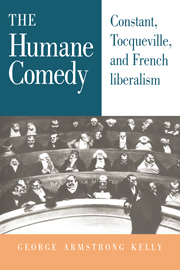6 - PARNASSIAN LIBERALISM
Published online by Cambridge University Press: 31 March 2010
Summary
STEPS TO PARNASSUS
The 1848 revolution was bewildering because it seems to have been made both for and against liberalism. It sent nominal liberals, like Guizot, packing into exile or, like Molé and Thiers, into temporary silence. Other liberals, of the “dynastic opposition,” could not begrudge the Republic or weep bitter tears over the fortunes of the Orléans family; yet they could regard this situation only as an unstable pis aller, possibly unfriendly to “liberty” and to themselves, and prone to sectarianism or tyranny once the unnatural fraternization had subsided. One could say that February 1848 displaced “doctrinaire” liberals and installed “democratic” ones. Yet the revolution in June united all these liberals with reactionaries against the desperate and Utopian struggle of the anonymous faubourgs, while even more convincing the “parti de la liberté” of its impotence in the face of violence, anti-parliamentarism, and “ the social question.” Finally, in 1852, the liberals confronted, and some capitulated to, a plebiscitary second empire. Although immediately ridiculed by the best minds, it turned out to be even more durable than the first imperial experience.
Up to almost its end, the empire of Napoleon III accelerated an inward turning of French liberalism, a retrenchment from politics to a cultural redoubt already prepared by the habits and practices of the Republic of Letters in the previous century. Subsequent happenings – the Franco-Prussian War, the Commune, and the ambiguous birth of the Third Republic – did little to change this stance. The agnostic irony about regimes intensified. When unbuttoned, persons of impeccable liberal feelings were even willing to extend that irony to the organization of society itself.
- Type
- Chapter
- Information
- The Humane ComedyConstant, Tocqueville, and French Liberalism, pp. 221 - 255Publisher: Cambridge University PressPrint publication year: 1992

